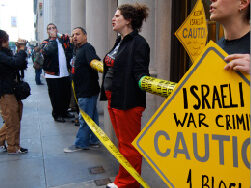


UNESCO, a specialized agency of the United Nations,has as its stated goal to "contribute to peace and security by promotingcollaboration among nations through education, science, and culture in order tofurther universal respect for justice, for the rule of law and for the humanrights and the fundamental freedoms" proclaimed in the UN Charter. UNESCO, theUnited Nations Educational, Scientific and Cultural Organization, ispolitically accountable to the international community. Whenschools under the UN flag are targeted, when children are targeted, when awhole population is systematically deprived of food and water, sanitation andelectricity, UNRWA, UNICEF and UNESCO, are not to be content with protest; theyshould live up to their responsibility by taking action. Below are appeals to UNESCOto fulfill its role in the maintenance of justice through cultural preservationand respect by a) revoking Israel'smembership in UNESCO, and b) joining the cultural and academic boycott of Israel.
To read the Arabic version, click here.


CONTACT
FOLLOW US
SUBSCRIBE TO OUR NEWSLETTER
BUSINESS OF BACKLASH
Click here to download the 120-report which exposes the funders of Zionist backlash on campuses and in communities
SEARCH THE SITE
NAVIGATION
WHO WE ARE
NEWS & OPINIONS
PROJECTS & CAMPAIGNS
CHAPTERS & SECTORS
RESOURCES
GET INVOLVED

